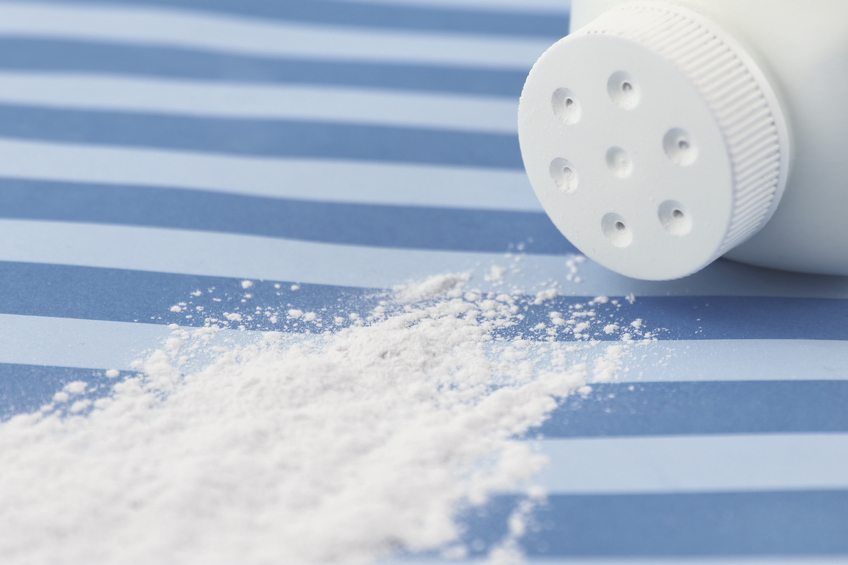Talc Lawsuits
Talcum powder (talc), most commonly found in baby powder, has been linked to ovarian cancer and various respiratory problems. Thousands of lawsuits now claim manufacturers failed to warn consumers of the dangerous risks associated with talc-based products.
Why File a Talc Lawsuit?
 Talc (talcum powder) is used frequently in households across the U.S. as a personal hygiene and cosmetics product. Also known as baby powder or body powder, talc has been linked to life-threatening side effects such as ovarian cancer, endometrial cancer and respiratory complications.
Talc (talcum powder) is used frequently in households across the U.S. as a personal hygiene and cosmetics product. Also known as baby powder or body powder, talc has been linked to life-threatening side effects such as ovarian cancer, endometrial cancer and respiratory complications.
Now, women and their families are filing lawsuits against Johnson & Johnson, one of the largest manufacturers of talc-based powders. They want the manufacturer to be held liable for holding back information from consumers – notably the severe and irreversible side effects associated with talc.
Some of the most common products that contain talc include:
- Various products that kill germs (antiseptics)
- Baby powder
- Body powder
- Lotions
- Feminine hygiene products
- Deodorants
- Street drug fillers, like heroin
Prior to the 1970s, talc contained asbestos – a known carcinogen that is known to cause cancers in and around the lungs when inhaled. However, since that time, laws require talc products used inside U.S. homes to be asbestos-free.
Many individuals may experience the various symptoms associated with talc; however, a great majority of people are unaware these health conditions could be linked to a frequently-used body powder.
Who Is Responsible for Talc Complications?
 A wide range of companies use talc in their products and should be held accountable for any harmful side effects they may cause.
A wide range of companies use talc in their products and should be held accountable for any harmful side effects they may cause.
The largest manufacturers of talc-based products are:
- Johnson & Johnson
- Valeant Pharmaceuticals
Lawsuits allege that these companies may have been aware of the dangerous complications associated with their products and failed to warn consumers about the risks. Even after research indicated the potential serious risks associated with talc-based products, many manufacturers still have not cautioned consumers about the possible negative consequences.
Legal Complaints About Talc
Women across the nation are suing Johnson & Johnson for their talc-based products that may have caused ovarian cancer. Many cases state concerns such as:
- Lack of research between talcum powder and ovarian cancer
- Failure to warn about the risks associated with talcum powder – including cancer and respiratory problems
- Deceptive information about the benefits of talcum powder for women and babies
- Absence of alternative ingredients for talcum powder
- Lack of recalls for talc-based products
Johnson & Johnson Talcum Powder Lawsuits
In 2013, a woman in Alabama was diagnosed with ovarian cancer after using talcum powder as a feminine hygiene product for years. Soon thereafter, she filed a lawsuit against Johnson & Johnson’s Baby Powder and Shower to Shower that caused her to develop cancerous cells. After the woman’s passing, the case was taken over by her children. By mid-2016, a jury awarded $55 million to the woman’s family – $10 million in compensation and $45 million in punitive damages.
Similarly, another woman used talc powder as a feminine product for close to 40 years before developing ovarian cancer. The lawsuit accused manufacturer Johnson & Johnson of concealing information about the severe risks associated with the product. It went on to state that the connection between talcum powder and ovarian cancer was downplayed, despite many studies suggesting otherwise. After a month-long jury trial, the woman was awarded $55 million – $5 million in compensation for her injury and $50 million in punitive damages.
Lawsuits continue to stack up against Johnson & Johnson, now reaching into the thousands. Although several class action suits have been filed, any compensation will only cover the manufacturers neglecting to advise consumers about the risk of ovarian cancer. For women who were diagnosed with ovarian cancer, an individual lawsuit will be able to provide compensation for any lost wages, emotional and physical pain, as well as medical bills.
Talc Litigation
 As part of litigation, many legal experts are pulling evidence from 1997 that includes a memo from a Johnson & Johnson medical consultant suggesting a link between talcum powder and ovarian cancer. Additionally, in 2006, the International Agency for Research on Cancer classified talcum powder as a possible human carcinogen if used in the female genital area.
As part of litigation, many legal experts are pulling evidence from 1997 that includes a memo from a Johnson & Johnson medical consultant suggesting a link between talcum powder and ovarian cancer. Additionally, in 2006, the International Agency for Research on Cancer classified talcum powder as a possible human carcinogen if used in the female genital area.
Since the number of suits continue to build against Johnson & Johnson, many may come together under a single court in a multidistrict litigation (MDL). An MDL will ensure cases are settled quickly and efficiently, as well as provide compensation based on an individual’s situation.
With an increasing amount of studies reporting the increased risk of ovarian cancer, more than 1,200 women have filed lawsuits against Johnson & Johnson related to their talc-containing powders.Getting an Attorney who knows Talc
 For generations, women have used talc-based products as part of their daily hygiene routine. Unfortunately, manufacturers like Johnson & Johnson failed to warn them about the dangerous risks associated with their products, specifically talcum powder.
For generations, women have used talc-based products as part of their daily hygiene routine. Unfortunately, manufacturers like Johnson & Johnson failed to warn them about the dangerous risks associated with their products, specifically talcum powder.
If you or a loved one have suffered from serious health conditions – including ovarian cancer – and have a history of using talcum powder, you may be entitled to compensation.
Last Edited: October 31, 2017